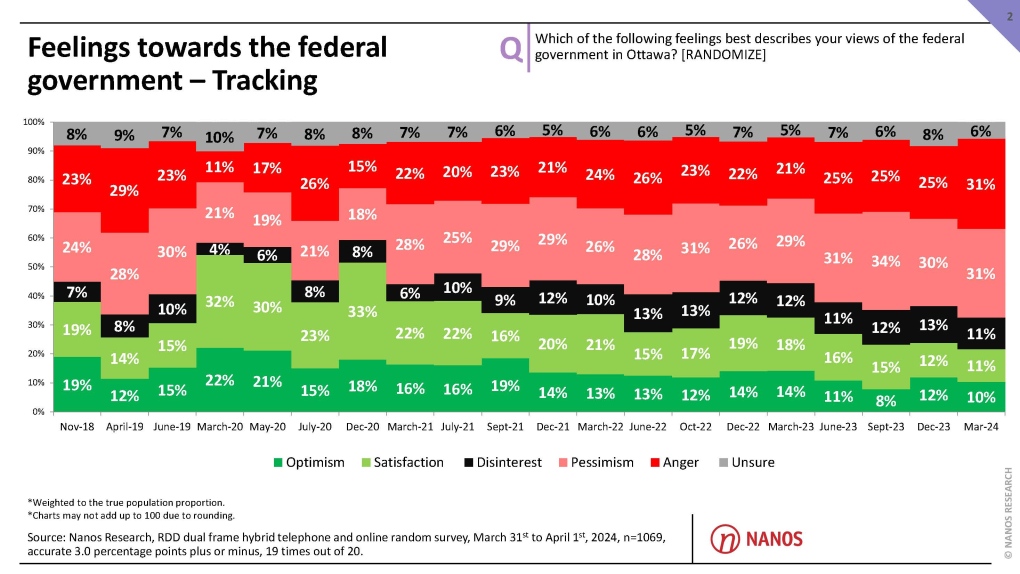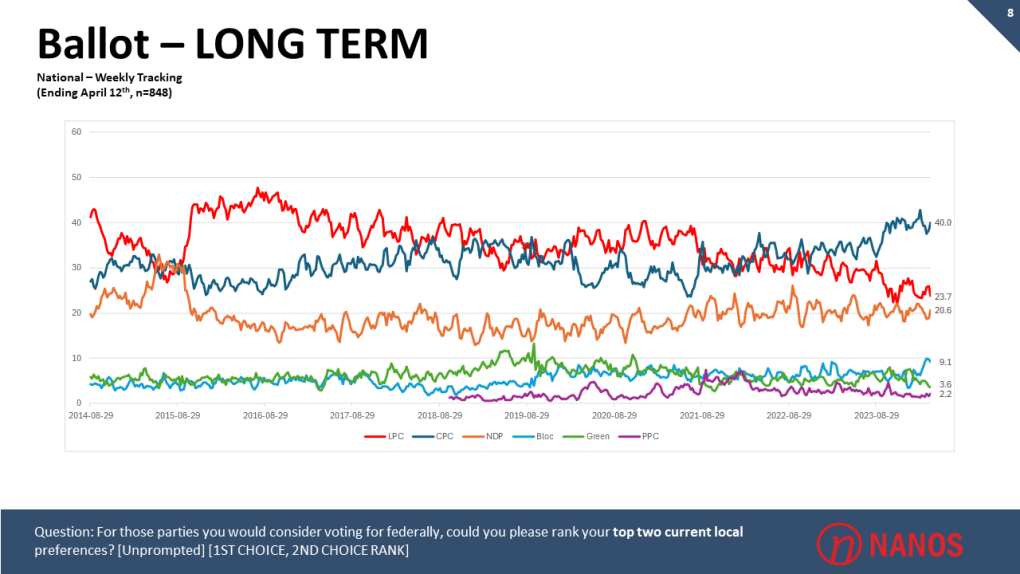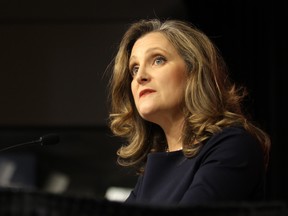Anger, pessimism towards federal government reach six-year high: Nanos survey
https://www.ctvnews.ca/politics/anger-pessimism-towards-federal-government-reach-six-year-high-nanos-survey-1.6852187?
Jesse Kline: Chrystia Freeland's Canada is no place for the ambitious or hard working
https://nationalpost.com/opinion/liberals-have-fully-embraced-being-a-tax-and-spend-party?
"加拿大不适合努力工作的人"!60%国民悲观愤怒:这个国家已崩溃
2024年04月19日 加国无忧 51.CA作者:51.CA 坚果儿
文章指出,尽管杜鲁多领导的自由党政府在过去8年半的时间为遇到的每一个问题投入了大量资金,但大多数加拿大人认为这个国家已经从根本上崩溃了。现在,自由党试图让民众相信,解决(他们帮助制造或未能解决的)问题的答案就是:撒钱。

 在本周二的预算案公布之前,加拿大副总理兼财政部长方慧兰(Chrystia Freeland)一反近年来的传统,在预算日之前的几周内试图让加拿大人相信,政府计划表现出财政紧缩。
在本周二的预算案公布之前,加拿大副总理兼财政部长方慧兰(Chrystia Freeland)一反近年来的传统,在预算日之前的几周内试图让加拿大人相信,政府计划表现出财政紧缩。
也许这表明自由党已经开始接受他们与新民主党(NDP)的邪恶联盟,今年,方慧兰甚至懒得假装财政责任会纳入她的考虑因素。
2024年预算案旨在解决两个主要问题——不是为了加拿大,而是为了这个国家的"执政党"。最近的民意调查显示,加拿大人对联邦政府的愤怒和悲观情绪创6年新高,大多数人认为这个国家已经支离破碎。
Nanos Research的一项调查显示,3月份有62%的加拿大人表示,他们对联邦政府感到愤怒或悲观,达到6年来的最高水平。
仅有11%的加拿大人感到满意,另有11%的人表示不感兴趣。


在此之前,Leger在今年早些时候对1,554名18岁或以上的加拿大人进行的一项在线调查结果显示:67%的加拿大人认为"这个国家已经崩溃了";50%的人对加拿大现下的管理方式感到愤怒。

同时,计划在下次选举中投票给保守党的年轻选民数量是自由党支持者的近两倍。

因此,方慧兰在过去三周里一直试图"撒钱贿赂"千禧一代和Z世代:5亿元用于青少年心理健康,24亿元用于人工智能(因为抢走人们工作的机器人也需要补贴),10亿元用于学校午餐,10亿元用于托儿贷款计划。更多的支出还在继续......
在其预算案的前言中,方慧兰向加拿大年轻人保证,自由党"计划建设一个更适合你们的加拿大,在这里你们可以取得进步,努力会得到回报,可以买得起房子"。他们将通过"建造更多的经济适用房"、"降低生活成本"和"以一种全民共享的方式发展经济"来实现这一目标。
不可否认的是,自由党在住房方面的一些想法是好的,比如激励各省和地方政府减少繁文缛节、放宽分区限制,以及在联邦土地上建造住房。
但这意味着,未来几年纳税人的数十亿元将用于资助"经济适用房",国家将承担数十亿元新公寓楼贷款的风险,还有数亿元资金将用于从市政基础设施到培训技工等各种项目。
同时,自由党不会通过减税、取消碳税和结束供应管理等政策来降低生活成本,从而迅速降低物价并刺激经济活动,而是将更多的钱用于补贴托儿服务、为学童的午餐买单,以及资助NDP的牙科和药物保险计划。
至于他们的经济增长计划,抛开细节不说,这将花费76亿元。
总的来说,2024年预算案在未来五年新增了530亿元的新支出。为了支付所有这些开支,同时将赤字保持在每年400亿元左右,直到2025年底的下一次联邦大选。2024年预算案打算仅在今年就从辛勤工作的加拿大人的口袋里多掏出219亿元。
不过,方慧兰向加拿大人保证,这些钱不会从中产阶级手中拿走,而是从通过提高资本利得税(capital gains tax),从成功的企业和富人手中夺取;以及通过再次增加烟草税和电子烟税,从对尼古丁上瘾的人手中攫取。
自由党政府希望资本利得税改革能在2024-25财年额外增加194亿元的收入。方慧兰试图淡化这一影响,她称增税只会影响到收入最高的0.13%人群,但这也将影响超过30万家纳税的公司,导致它们更不可能投资于经济和创造新的就业机会。
方慧兰说,她希望建立一个"努力工作就有回报"的国家,但她传递的信息却截然相反:没有必要努力工作来改善生活,因为政府会出钱照顾你的孩子、补牙、购买避孕药和糖尿病药物,这样你就可以维持你的生活。如果你真的努力奋斗并致富,你会受到严厉的惩罚。
在面对那些将受到这些措施惩罚的行业领袖时候,方慧兰问道:"你想生活在一个什么样的国家?只有父母能帮助付首付的年轻加拿大人才能买得起房子的国家?"
"你想生活在一个什么样的国家?政府已经在医疗保健、住房、养老金等方面进行了必要的投资,但却缺乏支付这些投资的政治意愿,而是选择将不断膨胀的债务转嫁给我们的孩子?"
的确,我们不想。但也许这位财政部长需要被提醒,正是自由党袖手旁观,房价在他们任期内上涨了60%;国家债务在十年间增加了一倍多,从2014-15年度的6490亿元增加到2024-25年度的约1.44万亿元。
而且,情况只会变得更糟。政府预计今年的赤字为398亿元,比2023年预算中预测的多出48亿元。
事实上,尽管自由党政府誓言要帮助年轻人,不让他们背负沉重的债务,但数字却讲述了一个完全不同的故事。今年,加拿大人将支付540亿元来偿还现有债务。到2028-29年,这一数字将增加到643亿元。
这是未来几代人将肩负的负担,他们将被迫从购买短期选票的高昂长期成本中吸取惨痛的教训。
 Megan DeLaire CTVNews.ca Journalist
Megan DeLaire CTVNews.ca JournalistMost Canadians in March reported feeling angry or pessimistic towards the federal government than at any point in the last six years, according to a survey by Nanos Research(opens in a new tab).
Nanos has been measuring Canadians' feelings of optimism, satisfaction, disinterest, anger, pessimism and uncertainty toward the federal government since November 2018.
The latest survey found that optimism had crept up slightly to 10 per cent since hitting an all-time low of eight per cent in September 2023.
However, 62 per cent of Canadians said they feel either pessimistic or angry, with respondents equally split between the two sentiments. (Nanos Research)
(Nanos Research)
"What we've seen is the anger quotient has hit a new record," Nik Nanos(opens in a new tab), CTV's official pollster and Nanos Research founder, said in an interview with CTV News' Trend Line on Wednesday.
Only 11 per cent of Canadians felt satisfied, while another 11 per cent said they were disinterested.
Past survey results show anger toward the federal government has increased or held steady across the country since March 2023, while satisfaction has gradually declined.
Will the budget move the needle?
Since the survey was conducted before the federal government released its 2024 budget, there's a chance the anger and pessimism of March could subside a little by the time Nanos takes the public's temperature again. They could also stick.
The five most important issues to Canadians right now that would influence votes, according to another recent Nanos survey(opens in a new tab) conducted for Bloomberg, include inflation and the cost of living, health care, climate change and the environment, housing affordability and taxes.
With this year's budget(opens in a new tab), the federal government pledged $52.9 billion in new spending while promising to maintain the 2023-24 federal deficit(opens in a new tab) at $40.1 billion. The federal deficit is projected to be $39.8 billion in 2024-25.
The budget includes plans to boost new housing stock, roll out a national disability benefit, introduce carbon rebates for small businesses and increase taxes on Canada’s top-earners.
However, advocacy groups have complained it doesn't do enough to address climate change, or support First Nations communities and Canadians with disabilities.
"Canada is poised for another disastrous wildfire season, but this budget fails to give the climate crisis the attention it urgently deserves," Keith Brooks, program director for Environmental Defence(opens in a new tab), wrote in a statement on the organization's website.
Meanwhile, when it comes to a promise to close what the Assembly of First Nations says is a sprawling Indigenous infrastructure(opens in a new tab) gap, the budget falls short by more than $420 billion. And while advocacy groups have praised the impending roll-out of the Canada Disability Benefit(opens in a new tab), organizations like March of Dimes Canada and Daily Bread Food Bank say the estimated maximum benefit of $200 per month per recipient won't be enough to lift Canadians with disabilities out of poverty.
According to Nanos, if Wednesday's budget announcement isn't enough to restore the federal government's favour, no amount of spending will do the trick.
"If the Liberal numbers don't move up after this, perhaps the listening lesson for the Liberals will be (that) spending is not the political solution for them to break this trend line," Nanos said. "It'll have to be something else."
Conservatives in 'majority territory'
While the Liberal party waits to see what kind of effect its budget will have on voters, the Conservatives are enjoying a clear lead when it comes to ballot tracking.
 (Nanos Research)
(Nanos Research)
"Any way you cut it right now, the Conservatives are in the driver's seat," Nanos said. "They're in majority territory."
According to Nanos Research ballot tracking from the week ending April 12, the Conservatives are the top choice for 40 per cent of respondents, the Liberals for 23.7 per cent and the NDP for 20.6 per cent.
Whether the Liberals or the Conservatives form the next government will come down, partly, to whether voters believe more government spending is, or isn't, the key to helping working Canadians, Nanos said.
"Both of the parties are fighting for working Canadians … and we have two competing visions for that. For the Liberals, it's about putting government support into their hands and creating social programs to support Canadians," he said.
"For the Conservatives, it's very different. It's about reducing the size of government (and) reducing taxes."
Watch the full episode of Trend Line in our video player at the top of this article. You can also listen in our audio player below, or wherever you get your podcasts. The next episode comes out Wednesday, May 1.
Methodology
Nanos conducted an RDD dual frame (land- and cell-lines) hybrid telephone and online random survey of 1,069 Canadians, 18 years of age or older, between March 31 and April 1, 2024, as part of an omnibus survey. Participants were randomly recruited by telephone using live agents and administered a survey online. The sample included both land- and cell-lines across Canada. The results were statistically checked and weighted by age and gender using the latest census information and the sample is geographically stratified to be representative of Canada. The margin of error for this survey is ±3.0 percentage points, 19 times out of 20.
With files from The Canadian Press, CTV News Senior Digital Parliamentary Reporter Rachel Aiello and CTV News Parliamentary Bureau Writer, Producer Spencer Van Dyke
Jesse Kline: Chrystia Freeland's Canada is no place for the ambitious or hard working
https://nationalpost.com/opinion/liberals-have-fully-embraced-being-a-tax-and-spend-party?
Canada's budget 2024: This is not your father's Liberal party, this is the spirit of Jack Layton coming to exact his revenge

Despite the Trudeau Liberals spending 8½ years throwing large sums of money at every problem that comes our way, a majority of Canadians think the country is fundamentally broken. Now, the Grits are trying to convince us that the answer to the problems they either helped create or failed to fix is … spending large sums of money.
In the lead-up to Tuesday’s budget, Finance Minister Chrystia Freeland deviated from her tradition in recent years of spending the weeks leading up to budget day trying to convince Canadians that the government was planning on showing fiscal restraint.
This advertisement has not loaded yet, but your article continues below.
?Katherine Brodsky: Owning an electric vehicle is madness and I regret ever buying oneEverything you need to know about sunscreen, according to a top Canadian dermatologist
Adam Zivo: 'We've absolutely lost control' to drug users, desperate B.C. hospital nurses say
FIRST READING: Jagmeet Singh is Canada's most expensive MP, Pierre Poilievre is the cheapest
Perhaps a sign that the Liberals have come to accept their unholy alliance with the socialist New Democrats, this year, Freeland didn’t even bother pretending that fiscal responsibility would factor into her calculations at all. This is not your father’s Liberal party — the party of Jean Chrétien and Paul Martin — this is the spirit of Jack Layton coming to exact his revenge.
The 2024 budget is intended to address two major problems — not for the country, but for its “natural governing party”: recent polls show that a majority of Canadians think the country is broken, and that nearly twice as many young voters are planning to cast a ballot for the Conservatives, as opposed to the Liberals, in the next election.
Thus, Freeland has spent the last three weeks attempting to bribe millennials and gen Z with their own money: $500 million for youth mental health, $2.4 billion for AI (because the robots that are going to take our jobs need subsidies, too), $1 billion for school lunches, $1 billion in loans for daycare centres. The list goes on.
In the forward to her budget, Freeland assured young Canadians that the Liberals “have a plan to build a Canada that works better for you, where you can get ahead, where your hard work pays off, where you can buy a home.” They’ll do this by “building more affordable homes,” “making life cost less” and “growing the economy in a way that’s shared by all.”
Some of their housing ideas — like incentivizing provinces and municipalities to reduce red tape and ease zoning restrictions, and building housing on federal lands — are good.
But billions in taxpayer dollars will also be spent in the coming years directly funding “affordable” (read: government) housing, the state will assume the risk for billions in new loans for apartment buildings and hundreds of millions more will be spent on everything from municipal infrastructure to training tradespeople.
Likewise, rather than making life less costly by reducing taxes, getting rid of the carbon tax and ending supply management, policies that would quickly lower prices and spur economic activity, the Liberals will be spending more on subsidized child care, picking up the cafeteria tab for schoolchildren and funding their new socialized dentistry and pharmacare programs.
As for their plan to grow the economy, well, I’ll spare you the details, but it will cost you $7.6 billion. Starting to see the pattern?
In total, budget 2024 introduced $53 billion in new spending over the next five years. In order to pay for all this while keeping the deficit at around $40 billion per year until the next federal election at the end of 2025, budget 2024 intends to pilfer an additional $21.9 billion from the pockets of hard-working Canadians, this year alone.
The government hopes the capital-gains changes will raise an additional $19.4 billion in the 2024-25 fiscal year. Freeland tried to downplay the effects of this by saying that the tax increase would only apply to the top 0.13 per cent of earners. But it will also affect the over 300,000 companies that pay capital gains, making them less likely to invest in the economy and create new jobs.
Freeland says she wants to build a country where “hard work pays off,” but the message she’s sending is quite the opposite: There’s no need to work hard and improve your lot in life because the government is going to pay to care for your children, fix your teeth and buy your birth control and diabetes meds, so you can maintain your lifestyle. And if you do happen to go that extra mile and strike it rich, you’ll be severely punished.
Addressing the captains of industry who will be penalized by these measures, Freeland asked, “What kind of country do you want to live in? … Do you want to live in a country where the only young Canadians who can buy their own homes are those with parents who can help with the down payment?
“Do you want to live in a country where we make the investments we need — in health care, in housing, in old-age pensions — but we lack the political will to pay for them and choose instead to pass a ballooning debt on to our children?”
Well, no, I don’t. But perhaps the finance minister needs to be reminded that it was the Liberals who sat idly by while house prices increased 60 per cent under their watch; and it was her government that more than doubled the national debt in a decade — increasing it to an estimated $1.44 trillion in 2024-25, from $649 billion in 2014-15.
And it’s only going to get worse. The government plans to run a $39.8-billion deficit this year — $4.8 billion more than it forecast in budget 2023. If anyone thinks Freeland has a hope in hell of reaching her deficit target of $38.9 billion next year, or the $20 billion projected for 2028-29, I have some beachfront property in Nunavut I think you’ll be extremely interested in.
That’s money that could be going to fund all manner of Liberal pet programs, but is instead paid as a penalty for years of fiscal mismanagement. And it’s a burden that will be shouldered by future generations, who will be forced to learn a hard lesson in the high long-term cost of buying short-term votes.
